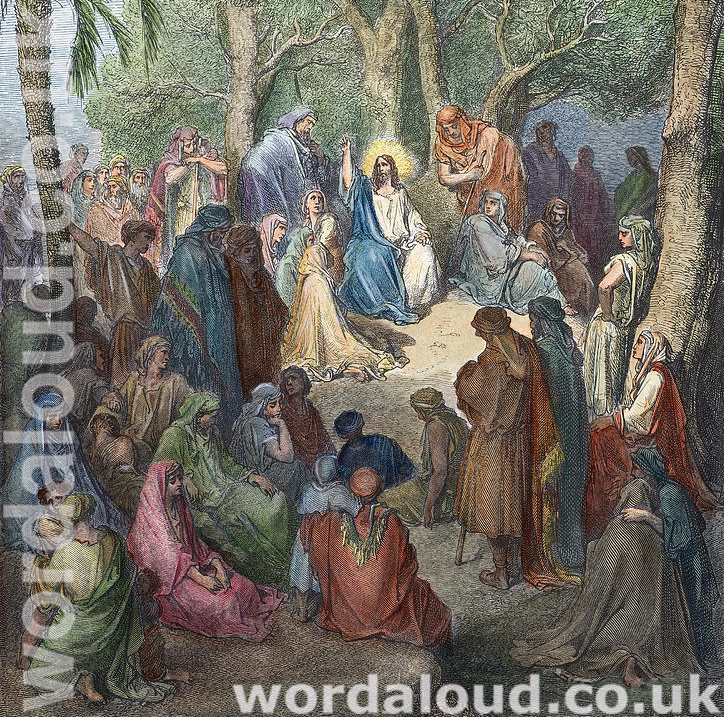Christian Art | Easter To Pentecost
John 6: 60-69 | King James Audio Bible | Daily Verses
60 Many therefore of his disciples, when they had heard this, said, This is an hard saying; who can hear it?
61 When Jesus knew in himself that his disciples murmured at it, he said unto them, Doth this offend you?
62 What and if ye shall see the Son of man ascend up where he was before?
63 It is the spirit that quickeneth; the flesh profiteth nothing: the words that I speak unto you, they are spirit, and they are life.
64 But there are some of you that believe not. For Jesus knew from the beginning who they were that believed not, and who should betray him.
65 And he said, Therefore said I unto you, that no man can come unto me, except it were given unto him of my Father.
66 ¶ From that time many of his disciples went back, and walked no more with him.
67 Then said Jesus unto the twelve, Will ye also go away?
68 Then Simon Peter answered him, Lord, to whom shall we go? thou hast the words of eternal life.
69 And we believe and are sure that thou art that Christ, the Son of the living God.
Jesus does not change his message in order to please people, even when that message proves unpalatable. He has not come to be all things to all men, but instead to tell us the truth. It is up to us, through faith, to hear and to understand and to accept Jesus’ teachings, and to know that our salvation is through him.
Many of Jesus’ listeners have balked at his words. Jesus has told them that he is the bread of life, that to be saved they must eat his flesh and drink his blood. This is a great mystery. Many of those who have followed him now find this completely incomprehensible. This truth of our salvation is not something that can be grasped through natural reason. It is only through faith that we may believe this revealed truth. We know that it is truth because Jesus has told us. Through grace, we have faith in Jesus’ words.
Jesus tells us that we cannot understand his words if we approach them in too human a way. It is not through our knowledge of earthly things that we may properly know Christ. He has come to us from heaven. The life he brings to us is the life of the spirit. Christ’s very words are spirit and life. We are taught through these verses of the Bible to reorient our sense of what is truly living, to know that our eternal life, free of sin and death, flows from Jesus. This is the supernatural understanding to which we are called.
Many of the disciples now desert Jesus. The twelve remain, even though one of them will betray Jesus, and Jesus knows this. Peter’s response to Jesus’ question is beautiful. His words are not only an expression of solidarity with the Lord; they are an expression of faith, as he declares the truth of Christ, that he is the Holy One of God, that he has the words of eternal life. Peter’s words are a shining example to us all, when our faith falters.
‘When God’s life-giving word came to dwell in human flesh, he remade it for its good, that is, for its life. Being linked with flesh in this unique form of union, he made it a source of life, just as he is by his own nature a source of life.
‘Thus the body of Christ gives life to those who share with him. By being among those who are liable to death his body drives death out; by bringing forth in itself a principle capable of utterly destroying corruption, his body expels corruption.’ St Cyril of Alexandria

![]()
King James Audio Bible | Endnotes
What Does It Mean That Jesus’ Words Are Spirit And Life?
In John 6: 60-69, Jesus’ disciples were struggling with his teachings about eating his flesh and drinking his blood, and many of them began to abandon him. In response, Jesus said to his remaining disciples: ‘Doth this offend you?… It is the spirit that quickeneth; the flesh profiteth nothing: the words that I speak unto you, they are spirit, and they are life.’ The significance of this statement has been interpreted variously by Christians.
To begin with, it is important to understand the context of this passage. Jesus had just fed the 5,000 with only five loaves of bread and two fish, and the people were amazed by Jesus’ power. However, Jesus knew that they were more interested in his miracles than in his message, so he began to teach them about the importance of spiritual nourishment. Jesus used the metaphor of bread to illustrate this point, saying: ‘I am the bread of life: he that cometh to me shall never hunger; and he that believeth on me shall never thirst.’ (John 6:35) Jesus then went on to explain that the bread he was offering was his own flesh, which he would give for the life of the world (John 6:51).
Many of Jesus’ listeners found this teaching difficult to accept, and they began to grumble and complain. Jesus responded by saying that their understanding was limited by their focus on the physical realm. Jesus emphasized that the true value of his words lay not in their literal meaning, but in the spiritual truth they conveyed. This is an understanding of Jesus’ meaning when he said: ‘The words that I speak unto you, they are spirit, and they are life.’
The phrase ‘spirit and life’ has been interpreted in different ways by theologians and scholars. Some have emphasized the spiritual dimension of Jesus’ words, suggesting that they have a transcendent quality that goes beyond their literal meaning. For example, the early church father Origen wrote that Jesus’ words were ‘spiritual food and drink, by which we are nourished unto life eternal’. Origen argued that the true meaning of Jesus’ teaching was not to be found in the physical act of eating and drinking, but in the spiritual union between the believer and Christ.
Others have focused more on the idea of ‘life’, interpreting Jesus’ words as a source of vitality and energy for the soul. Martin Luther, for example, wrote that Jesus’ words were ‘living, creative, active words… they are spirit and life, and work mightily in all who receive them in faith’. Martin Luther saw Jesus’ teaching as a transformative force that could bring new life to those who were spiritually dead.
In Catholic theology, the phrase ‘spirit and life’ has been closely associated with the sacrament of the Eucharist, in which Catholics believe that the bread and wine become the actual body and blood of Christ. The Catechism of the Catholic Church states that in the Eucharist, ‘Christ himself, the eternal Word of the living God, is present both in his humanity and in his divinity… under the appearances of bread and wine’ (CCC 1374). For Catholics, the words of Jesus in John 6:63 are a key affirmation of the reality of the Eucharist, as they emphasize the spiritual nature of Christ’s presence in the sacrament.
Protestant theologians have tended to interpret Jesus’ words in a more symbolic or metaphorical way, arguing that they do not necessarily refer to a physical act of eating and drinking. John Calvin, for example, wrote that the phrase ‘spirit and life’ means that ‘the doctrine of the Gospel, if it be received by faith, is the food of the soul, which quickens and invigorates it’. Calvin saw Jesus’ teaching as a call to faith, rather than a literal command to consume his flesh and blood.
In modern times, some scholars and theologians have emphasized the importance of the Holy Spirit in understanding Jesus’ teachings, pointing out that the Greek word for ‘spirit’ (pneuma) can also mean ‘breath’ or ‘wind’. This has led some to suggest that Jesus was saying that his words are infused with the life-giving power of the Holy Spirit, which is essential for understanding their true meaning.
Others have focused on the idea of ‘life’, interpreting Jesus’ words as a call to a new kind of existence that transcends physical death. This has led some to suggest that Jesus was offering a vision of eternal life that goes beyond mere survival, but rather involves a deep and meaningful connection with God and with one another.
The phrase ‘the words that I speak unto you, they are spirit, and they are life’ is a complex and multi-layered statement. Whether understood as a call to faith, a source of spiritual nourishment, a transformative force, or a promise of eternal life, the words continue to challenge and inspire Christians of all denominations. Scottish theologian John Baillie wrote: ‘In every age men have found in them [Jesus’ words] a power and vitality which has overcome every barrier of time and place and circumstance, and has proved itself the supreme spiritual force in human life.’
Pope Francis has said:
- ‘The words of Jesus in the Gospel are not to be interpreted literally, but in a spiritual sense. They are spirit and life, because they come from the Holy Spirit who gives life to the Church and to each of us.’ (Homily, April 28, 2013)
- ‘The Eucharist is the sacrament of communion that brings us out of individualism so that we may follow him together. It is the antidote to the mindset that, like the disciples in the Gospel, wants to domesticate the Lord. Jesus’ words, ‘The words that I have spoken to you are spirit and life,’ save us from this temptation.’ (Homily, June 14, 2018)
- ‘We must learn to listen to Jesus with the ears of our hearts, to understand his words not in a literal sense, but in a spiritual sense. His words are spirit and life, and they bring us closer to God and to one another.’ (General Audience, March 22, 2017)








